After the discovery on Dimmesdale’s chest. Chillingworth tries to push him indirectly to reveal his secret which he’s been hiding for 7 long years. This chapter takes place in Dimmesdale’s home. An important conversation takes place between the two men about the confession of sins. Chillingworth believes that some sins can only be confessed to God and not to earthly beings whereas Chillingworth says that its better to confess sins in this life. I feel the difference of opinion in the men reflects on an impending tragedy that might take place. The narrator’s tone shows that the two men aren’t close as they were before however Chillingworth continues living in Dimmesdale’s house. The comparison of Chillingworth is perhaps an important thing because for the very first time Hawthorne makes it clear for the reader that Chillingworth for sure is the Devil.
Had a man seen old Roger Chillingworth, at that moment of his ecstasy, he would have had no need to ask how Satan comports himself, when a precious human soul is lost to heaven, and won into his kingdom.
This passage reflects on the Devilish nature of Chillingworth. Hawthorne makes his reader dead sure that Chillingworth has evil filled in him. This shows how heartless and crazy in revenge Chillingworth had become.
I love the title of this chapter because it’s so unique. It’s an interesting chapter. Dimmesdale’s health is going down because of the vigils and sermons he holds. His hand on his chest assures his acquaintances that he seriously needs help although he refuses. As a result, the physician Roger Chillingworth is appointed. With the passage of time, the two men grow closer. Hawthorne shows that Dimmesdale and Chillingworth have completely opposite opinions which reflect on a possible rivalry in the coming chapters between the two men. Towards the end, Hawthorne shows how an evil spirit takes over Chillingworth and the townspeople suspect that he may not be a blessing afterall.The leech and Chillingworth connect perfectly because his motives now change from curing the reverend to sucking the life out of him.
Why, with such rank in the learned world, had he come hither? What could he, whose sphere was in great cities, be seeking in the wilderness? In answer to this query, a rumor gained ground,—and, however absurd, was entertained by some very sensible people,—that Heaven had wrought an absolute miracle, by transporting an eminent Doctor of Physic, from a German university, bodily through the air, and setting him down at the door of Mr. Dimmesdale's study!
The townspeople speculate as to why Chillingworth the Physician came here. They see him as an angle descended from Heaven to rescue the suffering clergyman. In the beginning they consider him a blessing and towards the end their opinion completely changes and believe that’s he’s an evil spirit. This also reflects on how observant the people were and their opinions were based on what they saw.
Set in Governor Bellingham’s house this chapter highlights Pearl’s importance in Hester’s life. This scene includes John Wilson, governor Bellingham, the cold Chillingworth and the reverend Dimmesdale. The ministers believe Hester is not a good influence on Pearl and hence want to separate them. Hawthorne brings out a firm side to Hester, as he shows she can go to any length tor Pearl which also depicts that Pearl is the sole reason for her living. I feel it’s unfair how the ministers want to rip off Hester of the only source of happiness she has. On the other hand, Dimmesdale comes to Hester’s rescue and pleads to the ministers that they shall not deprive Hester of her little Pearl. For some odd reason I can sense a connection between Hester and Dimmesdale, through his spoken words. Moreover for the first time, we see Pearl being touched by someone other than Hester. Dimmesdale’s affectionate kiss to pearl assures me that there is definitely something the reverend is hiding. Hawthorne’s language makes it easy to imagine the whole scene. For instance, “Little Pearl's unwonted mood of sentiment lasted no longer; she laughed, and went capering down the hall, so airily, that old Mr. Wilson raised a question whether even her tiptoes touched the floor.” I love how Pearl feels happiness even in the smallest of things that life has to offer. The ending of this chapter is interesting as Mistress Hibbins try to take advantage of Hester’s emotional state and invites her in the forest with a meeting with the devil. But its good to see that Hester has learned from her mistake and kindly refuses the Mistress
“God gave me the child!” cried she. “He gave her in requital of all things else, which ye had taken from me. She is my happiness!—she is my torture, none the less! Pearl keeps me here in life! Pearl punishes me too! See ye not, she is the scarlet letter, only capable of being loved, and so endowed with a million-fold the power of retribution for my sin? Ye shall not take her! I will die first!
I find Hester’s dialogue important because for the first time I see Hester refusing to something. I mean all this while whatever happened she went with the flow but her refusal to give up Pearl implies that she dearly loves Pearl. Also I like how she fuses her pain with pleasure when she says ‘she is my happiness! She is my torture’. It just shows that although Pearl has come with a great cost she is all what Hester lives for.
A new character comes into play and he is Governor Bellingham, a wealthy governor of the society. Poor Hester has problems waiting for her at every step, the society feels that if Pearl grows up with her she will take the same path Hester took and so wants the mother and daughter to be separated. It’s so frustrating, why does the society have to decide upon her life now. They should just leave her alone. Obviously Hester wouldn’t let that happen and so she heads over to the governor. Along the way she faces some harsh criticism.”Behold verily there is the woman of the scarlet letter and of a truth moreover there is the likeness of the scarlet letter running along by her side! Come therefore and let us fling mud at them” This dialogue really stands out and I think it’s significant as it portrays that Hester’s mistake is still fresh in their minds and she is still unforgiven. Hawthorne’s reference to the children as “children of the Puritans” shows that they have cut Hester and Pearl out of religion. I don’t see any change in the society’s behavior towards them, which is not that surprising. Pearl’s attraction towards the red rosebush symbolizes the pain and pleasure Hester went through. Pearl although a reminder of her mistake is also her only source of happiness. Red represents love and passion and the fact that pearl is wearing a red gown and Hester’s wearing a red letter completes the picture. A lot of symbolism is thrown out and it makes sense. Bellingham’s house seems nothing less than a palace. And just as Pearl is shocked to see a big place so am I, maybe a little less though.
"No my little pearl! Said her mother.” thou must gather thine own sunshine. I have none to give thee."
I find this important because Hester’s helplessness is shown when she says she has nothing to give to pearl. Sunshine symbolizes truth and purity both of which Hester doesn’t have the opportunity to give Pearl.
Pearl as we know is the result of the sin Hester has committed. This chapter gives us an insight on Pearl as she grows up. She is 3 at the moment but quite smart for her age. She’s bold and beautiful and most of all keeps Hester on her toes at all times. The name Pearl fits her so perfectly. She has no doubt come with a great cost to her mother. Although her mischievous actions contradict the peace and calmness I associate with a Pearl. But then again I think in the future that name will have a soothing effect on her. Also what strikes me is Pearl’s intelligence at this young age. I’d say she has a feeling that there is a story behind the ‘scarlet letter’ her mother adorns. The way Hawthorne has developed Pearl’s character so full of curiosity makes me want to believe that through her Hester’s partner in crime will be revealed. I can connect with how Hester has almost made Pearl her shadow and never goes anywhere without her. The bond between Hester and Pearl is something I can easily relate to. ‘A sportive impulse came over her during her deepest suffering’ reflects how Hester never let her emotional feelings take over something which reflects the Puritan beliefs that such worldly things never controlled them.
“Tell me! Tell me!”Repeated Pearl, no longer seriously, but laughing and capering about the floor. “It is thou that must tell me!”
I find this significant because Pearl’s constant refusal in believing in her “Heavenly father” shows that she is not easily going to be fooled into believing something she doesn’t want to believe in. Pearl also puts Hester in a confused situation because of the things she blurts out at times. It all just reflects on Pearl’s mature understanding of the atmosphere around her.
This chapter provides a much needed break from the tense atmosphere at Hester’s cell. It focuses solely on Hester and at what she does best; which is needlework. I appreciate how Hawthorne connects sunshine with Hester. After a few months she is released from the prison, sunshine falls upon her and makes her scarlet letter shine bright. Which I guess means that the wound is fresh as ever. Hester although has the opportunity to move away from her current location yet decides not to. I wonder what makes her stay at a place where there is nothing but haunted memories and hate left for her. Hester along with Pearl settles on the suburbs in a cottage left abandoned. To provide for herself and her little babe she uses her talent of needlework and becomes extremely popular. She does all kind off needle work except that of a veil because the society feels the bride might get the qualities of an adultress like Hester. At this point I feel Hester is lonely and looks for ways to spend her time. On one hand doing charity work and needlework on the other. I think she’s trying to keep herself occupied because as they say an empty mind is a devil’s workshop. Its good in a way. Although her talent is really appreciated by the society she is still shunned and is regarded as a symbol of shame. It’s unfortunate that even after she’s released from the prison. Her lover makes no attempt to see her it’s like he’s just left her and Pearl to die. I admire Hester’s patience and courage at this point.
This chapter answers the questions what the previous chapter left unanswered. For instance, the stranger who Hester sees amongst the crowd turns out to be no one but her very own Mr. Prynne. It’s a big shock for me because I wasn’t expecting Mr. Prynne to be revealed so soon and I honestly thought he wasn’t going to show up. I was rather hoping that her lover be revealed in this chapter, but that just keeps me more curious. Hawthorne in this chapter throws out a lot of information. Mr. Prynne is not himself and introduces himself as Roger Chillingworth physician. It makes sense why he does this because who would want to be associated with an adultress .This whole “interview” takes place in Hester’s cell. Where she comes face to face with her husband and they have the talk. I appreciate how Hester is so determined not to reveal her lover’s name. It just reflects her love towards him. Moreover the name Chillingworth sounds very cold and conniving, giving a detached feeling towards him. Hester’s doubt in the medicine he gives Pearl is justifiable because its possible that he may take revenge on the little girl for the wrong she has done to him. But then again his reply saying that he would give the same medicine to even his own child shows a delicate side towards Chillingworth .I can’t really form a strong opinion towards Chillingworth at the moment but his words just don’t give a positive feeling. I wonder till what extent he will go to find out the other man’s name. Also I like when Chillingworth realizes its his mistake in the first place that he let Hester go alone and didn’t follow up with her. Towards the end of his interview Chillingworth asks Hester to keep his true identity a secret and she agrees to it. At the same time reinforcing that she shall not reveal both the men’s identities.
“Between thee and me, the scale hangs fairly balanced. But Hester the man lives who has wronged us both! Who is he?
This is important because instead of lashing out at Hester, Chillingworth realizes that all is not her fault and that somewhere he is at fault too and its because of his careless actions she fell into this deep pit. Also his constant questioning to Hester about the other man depicts that he is well determined to get to the bottom of the whole matter at any cost.
The title of this chapter arouses curiosity from the start because I wonder who recognizes who.im hoping its Hester and her lover but here comes another turn while she stands at the scaffold, Hester’s eyes comes across a familiar face. Although it’s not revealed who she comes across it gives a great reason to speculate as to whom Hester sees. The stranger is described as a small and old man with a ‘furrowed visage ‘and claims to be a wanderer. Hawthorne’s description is as mysterious as his introduction to his characters. Moreover we see some official people like revered john Wilson and reverend Dimmesdale.i like how Hawthorne has built a high reputation of Reverend Dimmesdale. His striking personality, impending brow, and large, brown melancholy eyes assure me although not fully that Dimmesdale is an important character. Also his keen attempts towards Hester to reveal the name of the man depicts that he’s not satisfied with Hester & Pearl suffering alone. Furthermore I feel in this chapter the atmosphere becomes a bit chaotic firstly because the new “deformed” immigrant starts questioning about Hester and secondly because Dimmesdale’s speech to make Hester realize that she’s doing no great by keeping his name a secret, rather only “tempting him to do more sin” touches everyone to such an extent that the society also feels sympathetic towards Hester and her daughter for the very first time.
It was whispered, by those who peered after her, that the scarlet letter threw a lurid gleam along the dark passage way of the interior.
After taking a firm decision to not reveal his name at the scaffold Hester along with Pearl returns and the ‘lurid gleam’ from the scarlet letter gives little hope amongst this sad atmosphere. I like how Hawthorne has portrayed that Hester can light up the darkest of places; it just gives positive vibes and makes me believe that Hester will be triumphant in the end.
This chapter covers the journey of Hester Prynne from the prison to the scaffold which stands out in the market. The significance of this chapter is that we see Hester for the very first time as she emerges from the prison with the scarlet letter A on her chest along with Pearl close to her bosom. The “sunshine “that falls upon her is a symbol of purity and innocence something that she’s lost. The reactions of the society are very typical especially that of the women, they are jealous and insecure because of the beautiful letter on her gown and feel she might hide it and walk the streets as if nothing happened. Moreover I can connect with Hester when she’s lost in her childhood for a while and then suddenly the reality strikes her. Its sad how she touches the letter and sees pearl to realize that its really happening. She has committed a horrendous sin, something I feel she didn't quite expect from her innocent childhood. I like how Hawthorne smoothly changes from present to past. I wonder about the whereabouts of the other man, whether he’s watching Hester from the crowd or is he just not bothered at all. I am curious to know why he’s letting her suffer alone so miserably.
Could it be true? She clutched her child so fiercely to her breast that it sent forth a cry; she turned her eyes downward at the scarlet letter, and even touched it with her finger, to assure herself that the infant and the shame were real. Yes!-these were her realities-all else had vanished.(
I like how Hawthorne has described that moment when Hester realizes that whatever is happening is not just a bad dream. Its a harsh realization moment like a sudden prick from a thorn. I feel its important because at this very moment it hits Hester that she’s no longer innocent like she once was and that she has committed the gravest sin of all.
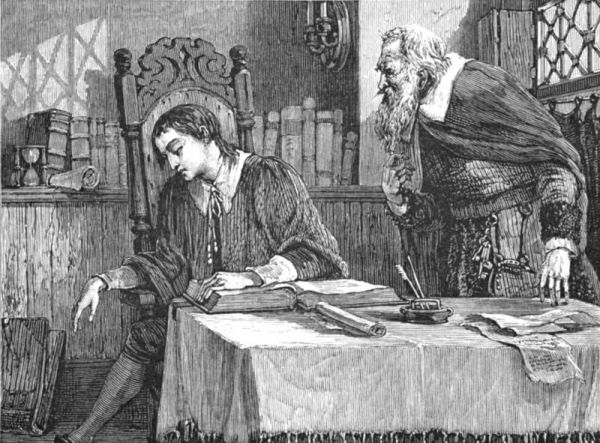
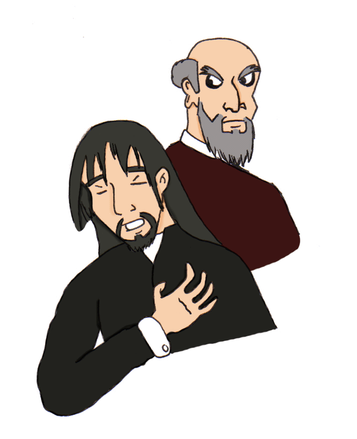
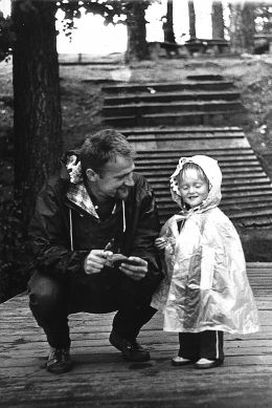
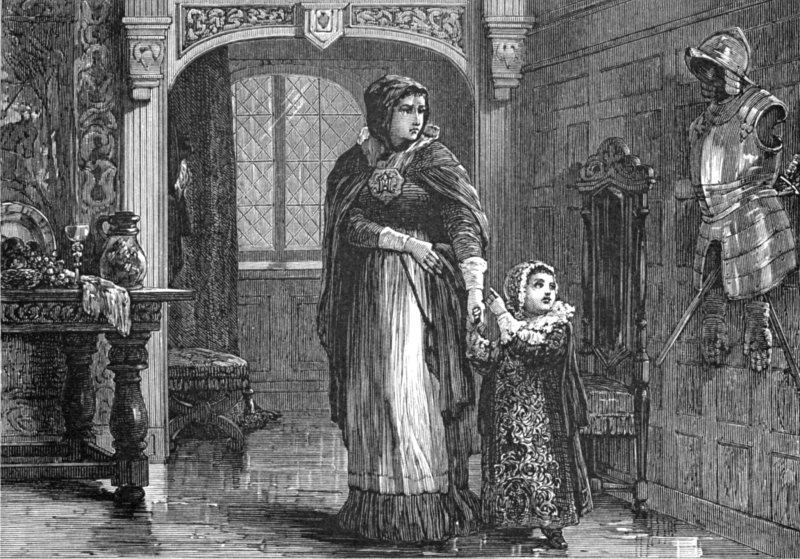
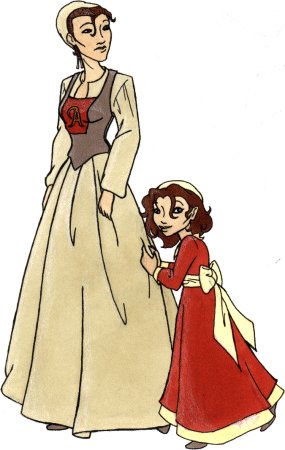

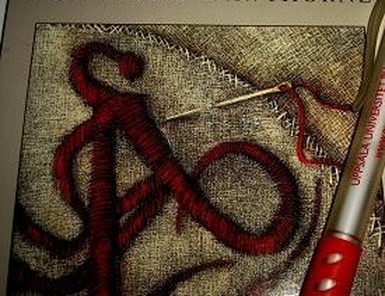
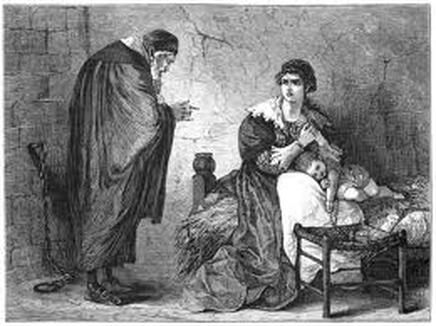
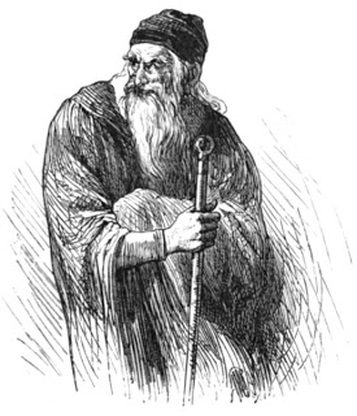
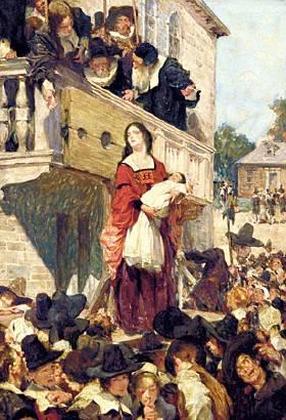
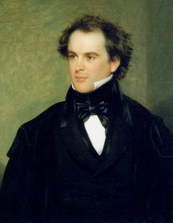
 RSS Feed
RSS Feed